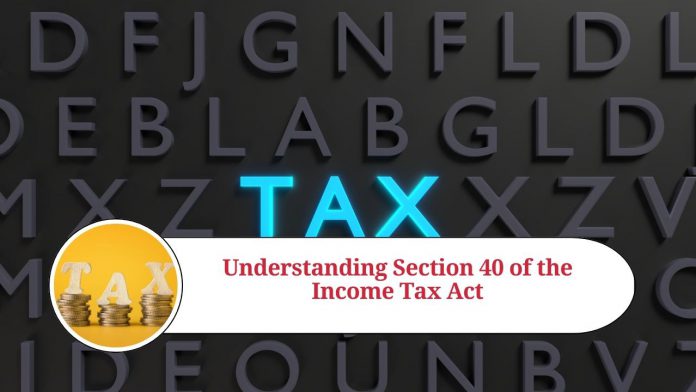Section 40 of the Income Tax Act deals with the disallowance of certain expenses incurred by businesses. It lays down the rules for determining whether a particular expense can be claimed as a deduction to compute taxable income or not.
The section is divided into several sub-sections, each dealing with a specific type of expense that may be disallowed under certain circumstances. Let us take a closer look at each of these sub-sections:
Sub-section (a): This sub-section deals with the expenses incurred on payment of interest to a relative of the taxpayer. If the interest paid exceeds a certain limit, the excess amount may be disallowed as a deduction.
Sub-section (b): This sub-section deals with the expenses incurred on payment of interest to a partner of the taxpayer. The same rule as in sub-section (a) applies here as well.
Sub-section (c): This sub-section deals with the expenses incurred on payment of interest to a firm in which the taxpayer is a partner. If the interest paid exceeds a certain limit, the excess amount may be disallowed as a deduction.
Sub-section (d): This sub-section deals with the expenses incurred on payment of royalty or fees for technical services to a non-resident. If the payment exceeds a certain limit, the excess amount may be disallowed as a deduction.
Sub-section (e): This sub-section deals with the expenses incurred on payment of rent to a relative of the taxpayer. If the rent paid exceeds a certain limit, the excess amount may be disallowed as a deduction.
Sub-section (f): This sub-section deals with the expenses incurred on payment of remuneration to a relative of the taxpayer. If the remuneration paid exceeds a certain limit, the excess amount may be disallowed as a deduction.
Sub-section (g): This sub-section deals with the expenses incurred on payment of remuneration to a director of the company. If the remuneration paid exceeds a certain limit, the excess amount may be disallowed as a deduction.
Sub-section (h): This sub-section deals with the expenses incurred on payment of any sum to an employee as a bonus, commission, or similar payment. If the payment exceeds a certain limit, the excess amount may be disallowed as a deduction.
Sub-section (i): This sub-section deals with the expenses incurred on payment of any sum to an employee as salary, if the employee is not in receipt of any taxable income. Such payments may be disallowed as a deduction.
In conclusion, Section 40 of the Income Tax Act is an important provision that sets out the rules for the disallowance of certain expenses incurred by businesses. Taxpayers need to be aware of these provisions to ensure that they do not face any adverse consequences in the form of tax liabilities, penalties, or interest payments
Read more useful content:
Here are some FAQs related to Section 40 of the Income Tax Act:
Q: What is Section 40 of the Income Tax Act? A: Section 40 of the Income Tax Act lays down the rules for the disallowance of certain expenses incurred by businesses.
Q: What expenses may be disallowed under Section 40? A: Expenses incurred on payment of interest, rent, remuneration, bonus, commission, or similar payments to relatives of the taxpayer or non-residents, or employees without taxable income, may be disallowed under Section 40.
Q: What is the definition of “relative” under Section 40? A: The term “relative” under Section 40 includes spouse, brother or sister, or lineal ascendant or descendant of the taxpayer.
Q: What is the limit for disallowance of expenses under Section 40? A: The limit for disallowance of expenses under Section 40 varies depending on the type of expense and the relationship between the taxpayer and the recipient of the payment.
Q: What are the consequences of disallowed expenses under Section 40? A: Disallowed expenses may result in the taxpayer facing additional tax liabilities, penalties, and interest payments.
Q: How can taxpayers avoid disallowed expenses under Section 40? A: Taxpayers can avoid disallowed expenses under Section 40 by ensuring that they comply with the limits and conditions set out in the sub-sections of the provision. It is recommended that taxpayers consult with a tax professional to ensure that they comply with all applicable tax laws and regulations.
Q: What expenses may be disallowed under Section 40? A: Expenses incurred on payment of interest, rent, remuneration, bonus, commission, or similar payments to relatives of the taxpayer or non-residents, or employees without taxable income, may be disallowed under Section 40.




















